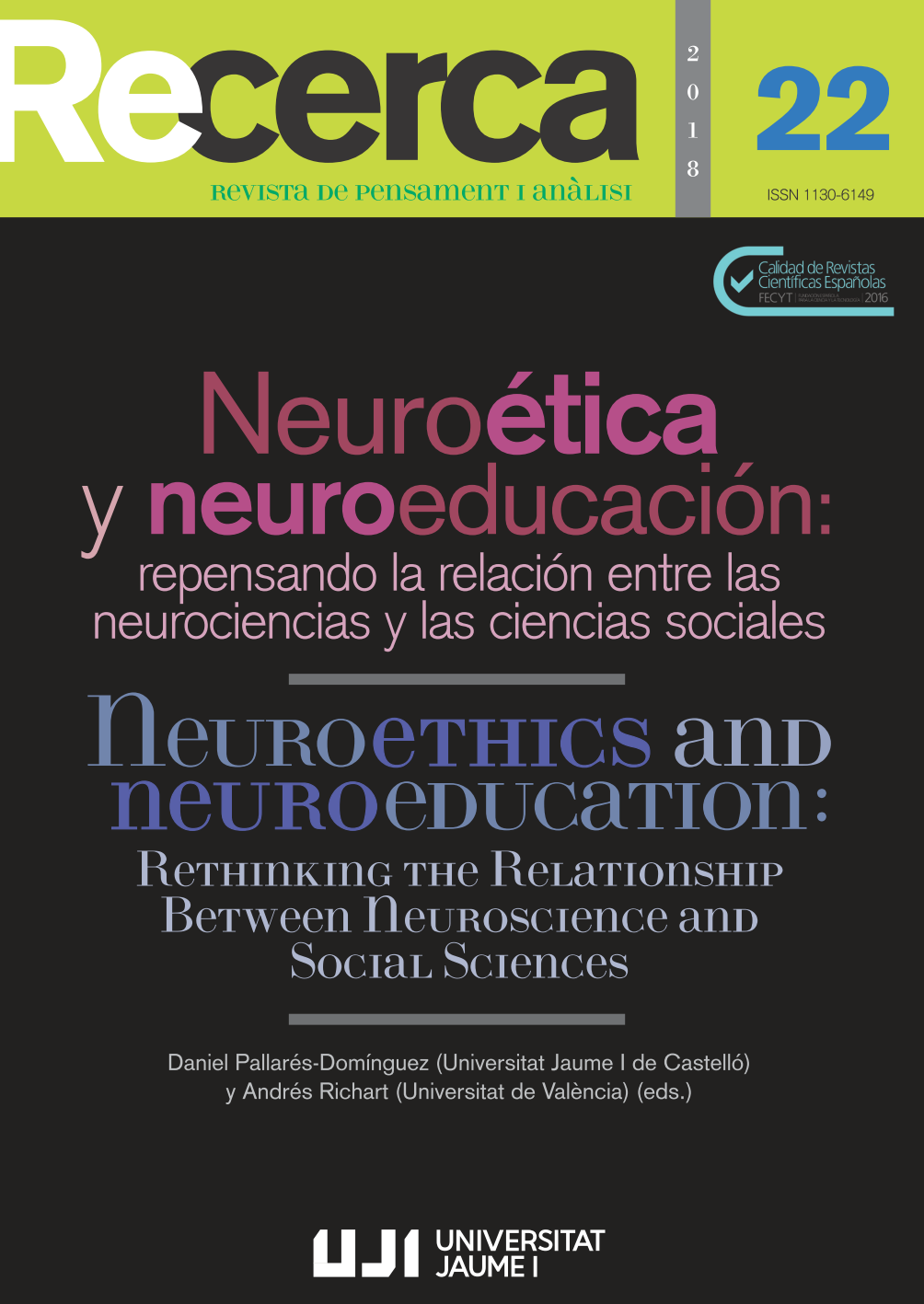¿Qué modelo interdisciplinar requiere la neuroética?
Contenido principal del artículo
Resumen
En este trabajo se analizan dos modos paradigmáticos en que en la actualidad se comprende la relación entre las disciplinas que se encuentran implicadas en la tarea de la neuroética, en su carácter de neurociencia de la ética. Particularmente se critica la forma que toma la interdisciplinariedad en estos dos modelos. En el primer caso se señala que la tarea de reflexión filosófica no da lugar a que la evidencia neurocientífica pueda modificar de modo importante los presupuestos teóricos en que se funda tal reflexión. En el segundo caso, por el contrario, el papel dado al componente empírico, necesario a la neuroética, obtura la reflexión ético-filosófica.
In this paper, I analyze two paradigmatic contemporary ways of understanding the relation between the disciplines involved in neuroethics. In particular, I criticize the form interdisciplinarity takes in these two models. It is pointed out that, according to one of these, the philosophical reflection does not allow neuroscientific evidence to influence in any significant way the theoretical presupositions of that reflection. According to the second model, on the contrary, the role of the empirical component, essential to neuroethics, rather blocks the ethical and philosophical reflection.
Descargas
Detalles del artículo
Citas
Álvarez-Díaz, Jorge Alberto (2013). Neuroética como neurociencia de la ética. Revista de Neurología, 57, 374-82.
Anscombe, Gertrude E. M. (1958). Modern Moral Philosophy. Philosophy, 33(124), 1-19.
Berker, Selim (2009). The Normative Insignificance of Neuroscience. Philosophy & Public Affairs, 37, 293-329.
Bourget, David & Chalmers, David (2014). What do philosophers believe? Philosophical Studies, 170(3): 465-500.
Buller, Tom (2006). What can neuroscience contribute to ethics? Journal of Medical Ethics, 32, 63-4.
Churchland, Patricia (2012). El cerebro moral. Barcelona: Paidós.
Conill Sancho, Jesús (2017). ¿Tiene arraigo en el cerebro la libertad? Pensamiento: Revista de Investigación e Información Filosófica, 73(276), 493-514.
Cortina, Adela (2011). Neuroética y neuropolítica. Sugerencias para la educación moral. Madrid: Tecnos.
Cortina, Adela (2013). Ética del discurso: ¿un marco filosófico para la neuroética? Isegoría, 48, 127-48.
Cortina, Adela (2014). Neuroética y ética del discurso. En Salles, Arleen & Evers, Kathinka, La vida social del cerebro. México DF: Fontamara.
Costa-Alcaraz, Ana María, Ruiz-Ripoll, Ada I. & Vázquez-Costa, Juan Francisco (2016). Aportaciones de las neurociencias al razonamiento moral. IV Congreso Internacional de Bioética: Bioética y Razonamiento Moral. Valencia.
Evers, Kathinka (2010). Neuroética: Cuando la materia se despierta. Buenos Aires: Katz.
Evers, Kathinka, Salles, Arleen & Farisco, Michele (2017). Theoretical Framing of Neuroethics: The Need for a Conceptual Approach. En Racine, Erik & Aspler, John, Debates About Neuroethics. Advances in Neuroethics (89-107). Cham: Springer.
Farah, Martha (2010). Neuroethics: An Introduction with Readings. Cambridge: MIT Press.
Farisco, Michele, Evers, Kathinka & Salles, Arleen (2016). Big Science, Brain Simulation, and Neuroethics. AJOB Neuroscience, 7(1), 28-30.
Fine, Cordelia (2010). Delusions of Gender: How Our Minds, Society, and Neurosexism Create Difference. Nueva York: W. W. Norton.
Gazzaniga, Michel (2005). The Ethical Brain. Nueva York: Dana.
Giordano, James (2011). Neuroethics: Traditions, tasks and values. Human Prospect, 1(1): 2-8.
Greene, Joshua, & Haidt, Jonathan (2002). How and where does moral judgment work? Trends in Cognitive Science, 6(12), 517-523.
Greene, Joshua (2008). The Secret Joke of Kant’s Soul. En Sinnott-Armstrong, Walter, Moral Psychology, vol. 3: The Neuroscience of Morality (35-79). Cambridge: MIT Press.
Greene, Joshua (2014). Beyond point-and-shoot morality: Why cognitive (neuro)science matters for ethics. Ethics, 124(4), 695-726.
Haidt, John (2001). The emotional dog and its rational tail, a social intuitionist approach to moral judgment, Psychological Review, 108(4), 814-834.
Hansson, Sven Ove (2008). Philosophy and other disciplines, Metaphilosophy, 39(4-5), 472-483.
Illes Judy, Kirschen, Matthew P. & Gabrieli, John D. (2003). From neuroimaging to neuroethics. Nature Neuroscience. 6(3), 205.
Joyce, Richard (2008). What neuroscience can (and cannot) contribute to metaethics. En Sinnott-Armstrong, Walter (ed.), Moral Psychology, volume 3: The Neuroscience of Morality: Emotion, Brain Disorders, and Development (371-394). Cambridge: MIT Press.
Levy, Neil (2012). Neuroethics. WIREs Cognitive Science, 3(2), 143-151.
Levy, Neil (2011). Neuroethics: a new way of doing ethics. AJOB Neuroscience, 2, 3-9.
Lewis, David (1983). Philosophical Papers, vol. 1, Oxford: Oxford University Press.
Libet, Benjamin (1999). Do we have free will. Journal of Consciousness Studies 6, 47-57.
MacIntyre, Alasdair (1981). After virtue: A study in moral theory. Notre Dame: University of Notre Dame Press.
Marcos, Adolfo (2015). Neuroética y vulnerabilidad humana en perspectiva filosófica. Cuadernos de Bioética, 26(3), 397-414.
Marcus, Steven (ed.) (2004). Neuroethics: Mapping the Field; Conference Proceedings, May 13 - 14, 2002, San Francisco, California. Nueva York: Dana.
Molnar, George (2003). Powers. Oxford: Oxford University Press.
Mumford, Stephen & Anjum, Rani (2011). Getting Causes from Powers. Oxford: Oxford University Press.
Northoff, Georg (2009). What is neuroethics? Empirical and theoretical neuroethics. Current Opinion in Psychiatry, 22(6): 565-569.
Parens, Eric & Johnston, Josephine (2007). Does it make sense to speak of neuroethics?: Three problems with keying ethics to hot new science and technology. EMBO Reports, 8(supl 1), 61-64.
Racine, Eric (2010). Pragmatic Neuroethics: Improving Treatment and Understanding of the Mind-brain. Cambridge: MIT Press.
Reverter Bañón, Sonia (2016). Reflexión crítica frente al neurosexismo. Pensamiento. Revista de Investigación e Información Filosófica, 72(273), 959-979.
Roskies, Adina (2002). Neuroethics for the New Millenium. Neuron, 35(1), 21-23.
Roskies, Adina (2016). Neuroethics. The Stanford Encyclopedia of Philosophy [versión en línea] Standford, CA: The Metaphisics Research Lab. Retrived from: https://plato.stanford.edu/archives/spr2016/entries/neuroethics/.
Safire, William (2004). Introduction. En Marcus, Steven (ed.). Neuroethics: Mapping the Field; Conference Proceedings, May 13 - 14, 2002, San Francisco, California. Nueva York: Dana.
Salles, Arleen & Evers, Kathinka (eds.) (2014). La vida social del cerebro, México: Fontamara.
Salles, Arleen & Evers, Kathinka (en prensa). Social neuroscience and Neuroethics: A Fruitful Synergy. En Ibáñez, A., Sedeno, Lucas, & Garcia, Adolfo (eds.). Social Neuroscience and Social Science: The Missing Link. Nueva York: Springer.
Schaffer, Jonathan (2010). Monism: The Priority of the Whole. Philosophical Review, 119, 31-76.
Shook, John & Giordano, James (2014). A Principled and Cosmopolitan Neuroethics: Considerations for International Relevance. Philosophy, Ethics, and Humanities in Medicine, 9(1), 2-13.


